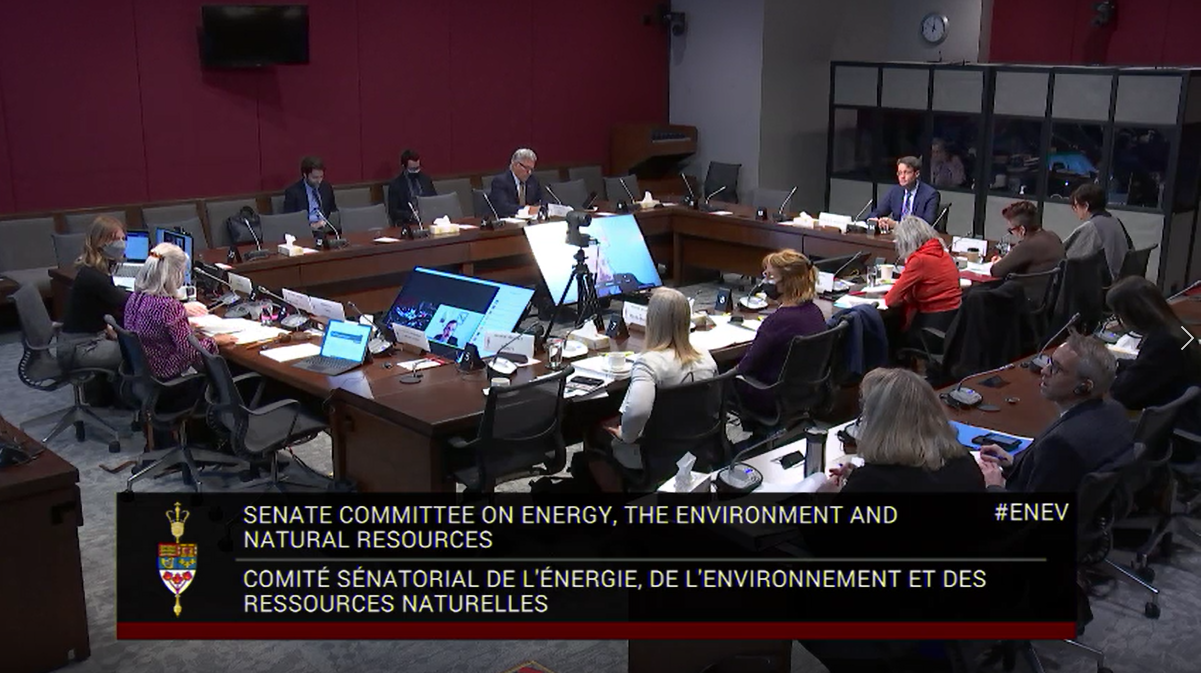Blog /
Canadian Chamber Addresses Importance of Canada’s Energy Sector Before Senate Committee
Canadian Chamber Addresses Importance of Canada’s Energy Sector Before Senate Committee
On December 1, 2022, we addressed the importance of Canada’s energy sector to meeting both economic and environmental objectives before the Senate Standing Committee on Energy.

On December 1, 2022, David Billedeau, the Canadian Chamber’s Senior Director Natural Resources, Environment, and Sustainability appeared before the Senate Standing Committee on Energy, the Environment and Natural Resources, to highlight the importance of Canada’s energy sector to meeting both economic and environmental objectives.
In particular, Billedeau highlighted three recommendations from the recent Canadian Chamber Net-Zero Council report, How We Get There Matters: Establishing a Path to Net-zero in Canada:
- Canada should develop a detailed green skills plan to unlock the opportunities that net zero will bring.
- Canada should increase overall net zero funding and do more to de-risk and address barriers to private sector investment.
- Canada should consider a holistic picture of emissions—and predicate sector environmental policies on global emission reduction opportunities.
Read and watch Billedeau’s opening remarks below.
David Billedeau’s Opening Remarks
Check against delivery.
Mister Chair and Honourable Members, thank you for the opportunity to attend today’s discussion on behalf of the Canadian Chamber of Commerce.
Canada’s oil and gas sector plays an important role in ensuring the country’s economic prosperity, energy security, and sustainable development.
In terms of economic impact, in 2020, our collective oil and gas sector provided $105 billion to Canada’s gross domestic product and maintained nearly 400,000 jobs across Canada. The production sector alone is expected to contribute $50 billion in taxes and royalties in 2022. This annual revenue to governments is vital for the development and maintenance of Canada’s infrastructure, such as roads, schools, and hospitals.
At the same time, Canada’s oil and gas sector accounts for approximately 27% of the country’s total greenhouse gas emissions. Therefore, it is vital to have a strategy to decarbonize while maintaining the economic benefits of continued production.
With that said, the sector is broadly committed to sustainable development and reaching Canada’s 2050 net zero target. Canada’s oil and gas sector has continuously reduced emissions intensity over the past years without far reaching regulatory requirements to do so. Moreover, oil sands firms have committed to pursuing projects valued at nearly $25 billion to reduce emissions and improve energy efficiency of operations by 2030. In effect, Canada’s oil and gas sector is poised to demonstrate global research, development, and deployment leadership for the most advanced decarbonization technologies.
As the industry continues to evolve, so too does its workforce. Per Statistics Canada, as of 2019: 36% of the sector’s workforce was female; 26% belonged to a visible minority group; nearly 10% identified as being Indigenous; and the sector is a primary employer of new Canadians. In sum, the sector is providing strong middle class employment opportunities for all Canadians—and has a positive economic and employment impact in almost every region of our country.
Canada’s oil and gas sector is also positioned to support global decarbonization efforts and energy needs. Ongoing conflict in Europe has reinforced the need for Canadian leadership to support international energy security. At the same time, Canadian energy products hold significant opportunity to displace carbon intensive alternatives within international markets.
Since 2021, the Canadian Chamber has been working with members of its Net Zero Council—a multi-sector collective of business leaders committed to net zero—to ensure Canada’s pathway to net zero is competitive, enhances investment, creates jobs for Canadians, and promotes innovation.
To that end, I appreciate the opportunity to table three salient recommendations from the Net Zero Council’s recent report on how Canada can reach emissions targets.
First, Canada should develop a detailed green skills plan to unlock the opportunities that net zero will bring. Delivering net zero while capitalizing on its economic opportunities will require a workforce strategy that includes a comprehensive set of employment and skill projections to identify gaps across domestic industries and geographies.
Second, Canada should increase overall net zero funding and do more to de-risk and address barriers to private sector investment. The Chamber encourages the Government of Canada to directly fund innovative climate technology programs, secure co-investment through public-private partnerships, deliver support for R&D projects, and de-risk private sector investments in clean technologies. The need to better compete for investment capital is heightened due to the recent US Inflation Reduction Act.
Third, Canada should consider a holistic picture of emissions—and predicate sector environmental policies on global emission reduction opportunities. To that end, the federal government should promote and strengthen Canada’s energy sector to reduce global supply chain-related emissions of products, materials, and businesses.
However, Canada stands alone as one of the world’s primary oil and gas producers that is hindering the success of its domestic energy industry through decarbonization strategies that create added costs, regulations, and pathways that do not consider financial or technical viability.
Such actions reduce our ability to compete globally and result in the loss of market share to OPEC and other non-democratic, non-free market nations.
In close, the Canadian Chamber encourages the Committee to recognize that the oil and gas sector is committed to combatting climate change and reaching emission reduction targets. Moreover, there is boundless potential for Canada to drive global transitions to net zero. However, partnerships between the private sector and government are required to advance these ends.
Thank you again for your time and consideration. I look forward to your questions.
Related News

What We Heard: Key Takeaways from the Natural Resources Tour “Charting the Path”

What We Heard: Delivering Connected Care for Canadians




